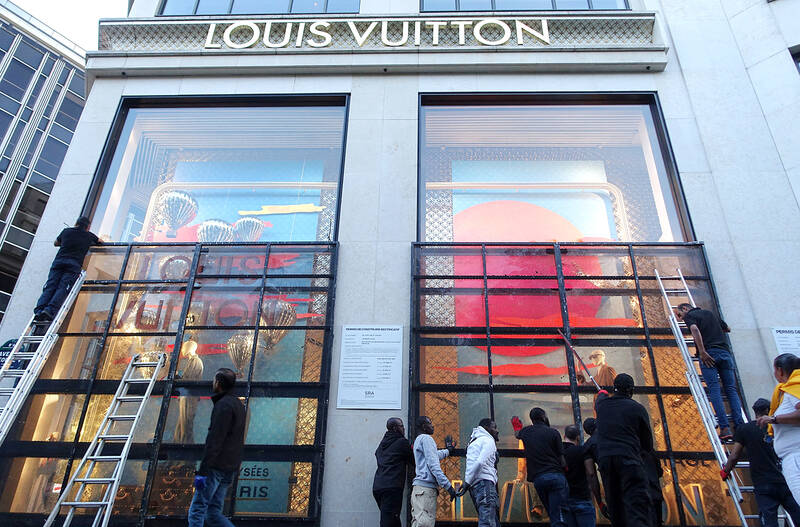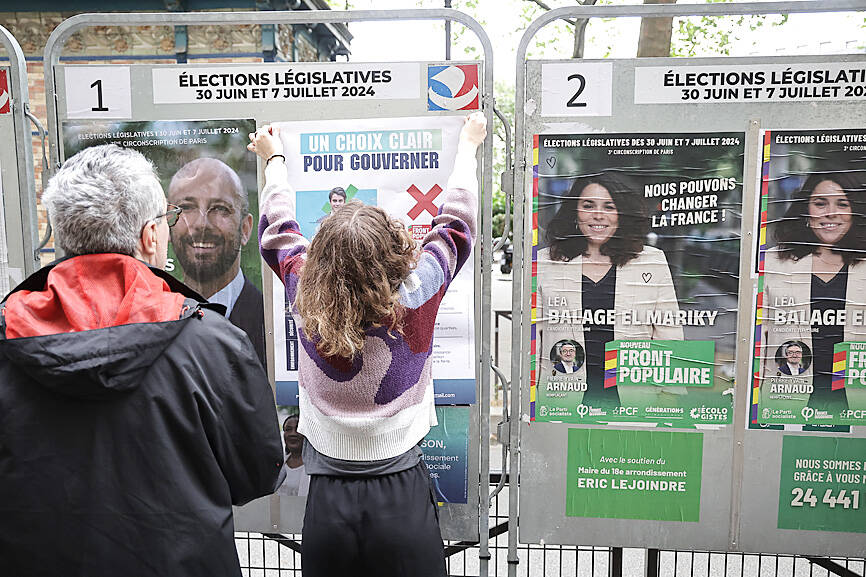France’s business elite is anxious about volatile politics, inexperienced policymakers, street protests and a possible wave of bankruptcies in the coming months, executives meeting in Provence said ahead of yesterday’s parliamentary election.
Corporate leaders gathered on Friday and Saturday in the southern city of Aix-en-Provence for France’s annual answer to Davos have been among the main beneficiaries of French President Emmanuel Macron’s pro-business reforms since he was first elected in 2017.
Far-right and left-wing parties want to roll back some of Macron’s reforms, ranging from raising the retirement age to scrapping a wealth tax on financial assets.

Photo: Reuters
Voters are set to derail his drive to ease taxes and other constraints on business when — as it is widely expected — they hand Macron’s party a decisive defeat in an election that polls suggest would give the far right the most seats in parliament.
“We are very concerned about what’s going to happen,” aerospace company Safran SA chairman Ross McInnes said. “Whatever the political configuration that will come out of Sunday’s vote, we are probably at the end of a reform cycle that started ten years ago.”
While business leaders tip-toed around the election topic in the public panels, they did not conceal their anxiety on the sidelines over the rise of the far right and the far left.

Photo: EPA-EFE
The far-right National Rally (RN) would likely fall short of an absolute majority, leaving other parties to figure out whether a coalition can be formed to govern, which is unprecedented in modern France and would likely be unstable.
“Nothing good ever comes from chaos. I don’t know what’s going to happen, but this is a country that has seen social unrest before,” the head of a large French industrial group said.
Business leaders voiced concern that politicians standing at the gates of power lacked experience steering the eurozone’s second-largest economy, while they also balked at the prospect that France’s already considerable tax burden could grow under the left-wing alliance.
The political uncertainty has already driven up France’s cost of borrowing as bond investors demanded the highest risk premiums over equivalent German debt in 12 years after Macron called the snap election last month.
Meanwhile, corporate investors in the real economy are also apprehensive about the political and economic outlook.
“We’ve continued to take investment decisions over the past weeks, including in France. But clearly if we had had to make a really major investment decision we probably would have waited to have better visibility,” private equity firm Ardian France chief executive officer Mathias Burghardt said.
With no sign the political volatility would subside anytime soon, the higher financing costs could soon feed through to French companies just as they are preparing to roll over ultra-low-cost loans from the COVID era at higher rates, executives said.
“That creates a scenario where we expect corporate defaults to continue to rise in France beyond what could have been if such a political disruption didn’t happen,” Allianz SE economic research head Ana Boata said.
Macron’s pro-business reform drive often jarred with voters, sparking sometimes violent street protests like the yellow vest movement of 2018, or marches last year against an overhaul of the retirement system.
Although he won a second term in 2022, Macron has also failed to connect with many voters, who see him as a product of the closely intertwined political and business elites that run the country.
The anti-immigration, euroskeptic RN has proposed to roll back Macron’s last year increase in the retirement age to 64 from 62 and cut taxes on energy, saying these measures would be paid for by slashing welfare spending benefiting immigrants.
The left-wing New Popular Front alliance’s tax-and-spend program would bring back a wealth tax and raise the minimum wage by 14 percent while also scrapping Macron’s pensions reform.
A minority government would be constrained by the risk of votes of no confidence, likely making it less able to move ahead with new legislation.
Beyond the possibility of a hamstrung government, business leaders also worried about the knock-on impact RN’s anti-immigrant policies are likely to have on France’s workforce.
“Demographics show us that we need to attract talent,” McInnes said. “This country has been sustained by immigration for 300 years.”

Intel Corp chief executive officer Lip-Bu Tan (陳立武) is expected to meet with Taiwanese suppliers next month in conjunction with the opening of the Computex Taipei trade show, supply chain sources said on Monday. The visit, the first for Tan to Taiwan since assuming his new post last month, would be aimed at enhancing Intel’s ties with suppliers in Taiwan as he attempts to help turn around the struggling US chipmaker, the sources said. Tan is to hold a banquet to celebrate Intel’s 40-year presence in Taiwan before Computex opens on May 20 and invite dozens of Taiwanese suppliers to exchange views

Application-specific integrated circuit designer Faraday Technology Corp (智原) yesterday said that although revenue this quarter would decline 30 percent from last quarter, it retained its full-year forecast of revenue growth of 100 percent. The company attributed the quarterly drop to a slowdown in customers’ production of chips using Faraday’s advanced packaging technology. The company is still confident about its revenue growth this year, given its strong “design-win” — or the projects it won to help customers design their chips, Faraday president Steve Wang (王國雍) told an online earnings conference. “The design-win this year is better than we expected. We believe we will win

Chizuko Kimura has become the first female sushi chef in the world to win a Michelin star, fulfilling a promise she made to her dying husband to continue his legacy. The 54-year-old Japanese chef regained the Michelin star her late husband, Shunei Kimura, won three years ago for their Sushi Shunei restaurant in Paris. For Shunei Kimura, the star was a dream come true. However, the joy was short-lived. He died from cancer just three months later in June 2022. He was 65. The following year, the restaurant in the heart of Montmartre lost its star rating. Chizuko Kimura insisted that the new star is still down

While China’s leaders use their economic and political might to fight US President Donald Trump’s trade war “to the end,” its army of social media soldiers are embarking on a more humorous campaign online. Trump’s tariff blitz has seen Washington and Beijing impose eye-watering duties on imports from the other, fanning a standoff between the economic superpowers that has sparked global recession fears and sent markets into a tailspin. Trump says his policy is a response to years of being “ripped off” by other countries and aims to bring manufacturing to the US, forcing companies to employ US workers. However, China’s online warriors